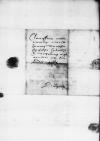 AAWO, AB, D. 3, f. 25r
AAWO, AB, D. 3, f. 25r
Quando putas, praesul ornatissime, vacabit ⌊Panormitano⌋ legere cum iudicio totum psalterium? Ego certe, quod ad me attinet, minus formido iudicium [cen]suram on the margin⌈cen hidden by binding⌈[cen]cen hidden by binding⌉suram[cen]suram on the margin⌉ ⌊Panormitani⌋ quam theologorum; sed ideo cupivi potius hic alicui hoc dari negotii, ut finem citius assequerer. Mitte quaeso per aliquem ex tuis quinquaginta illos quos habes et; si tum illis lectis alios ille superinscribed in place of crossed-out ipse⌈ipseilleille superinscribed in place of crossed-out ipse⌉ videre volet, ego eos ipse adferam ad illum. Offert mihi episcopus quidam superinscribed⌈quidamquidam superinscribed⌉ Gallus se curaturum, si mittere voluero exemplar, ut edantur cum privilegio regis aut ⌊Parisiis⌋ aut ⌊Lugduni⌋. Mitterem reliquos, nisi is, cuius manu priores quos habes superinscribed⌈habeshabes superinscribed⌉ quinquaginta scripti sunt on the margin⌈suntsunt on the margin⌉, abiisset hinc cum cubiculario legati in ⌊Galliam⌋. Spero huius comoediae laetum aliquem exitum ... illegible⌈...... illegible⌉, quae initium habet tam triste. Puto dominum Deum voluisse me non solum intellegere paulo quam hucusque rectius psalmos hos hoc anno, sed et experiri adversa paene omnia, quorum in toto opere mentio fit. Complevi annum quadragesimum, sed nullo, quod sciam, quam hoc superinscribed⌈quam hocquam hoc superinscribed⌉ umquam vixi insuavius. Proficisci in ⌊Galliam⌋ propemodum certum est. Si tamen putarem ⌊Spiram⌋ venturum ⌊Philippum⌋, profectionem differrem; valde cuperem posse cum illo colloqui; biduo aut triduo sperarem nos duos plus boni facturos in sedandis iis tumultibus quam factum est tot mensibus furiosis quorun<dam> clamoribus ⌊Augustae⌋. Nec dubito quin ⌊Philippus⌋ ipse tam cuperet convenire me, quam ego illum. Sum enim nomine illi non minus notus quam ipse mihi. Vale Domine mi! Per ⌊Gemmam⌋, [qui] hic serio [aeg]rotat on the margin⌈qui hidden by binding⌈[qui]qui hidden by binding⌉ hic serio aeg hidden by binding⌈[aeg]aeg hidden by binding⌉rotat[qui] hic serio [aeg]rotat on the margin⌉; ubi pristinam valetudinem receperit, scribam latius, aut ipse ego veniam. Ignosce precor, Domine, lituris et neque me iudices quaeso ex moribus praesentibus.Iterum vale!


 AAWO, AB, D. 3, f. 25v
AAWO, AB, D. 3, f. 25v